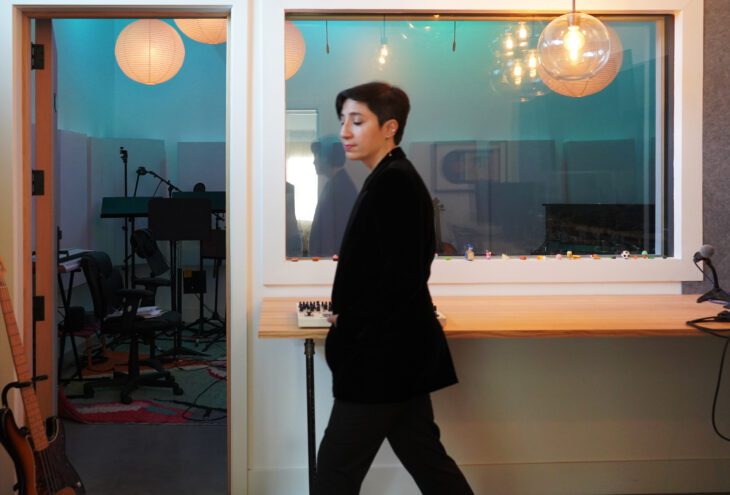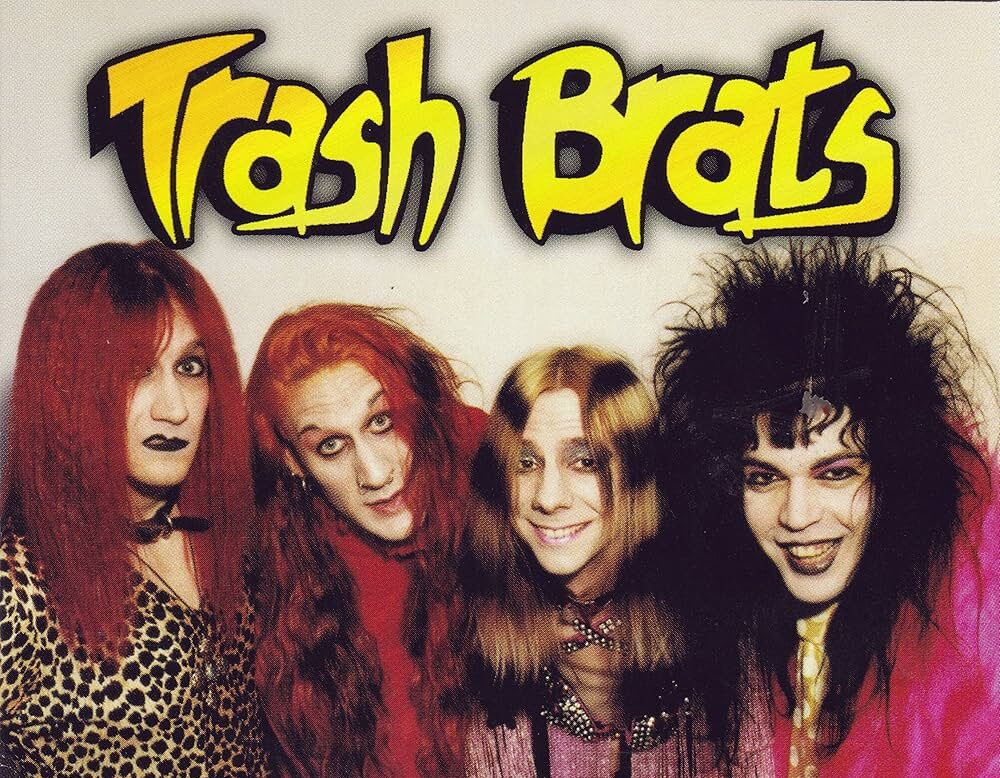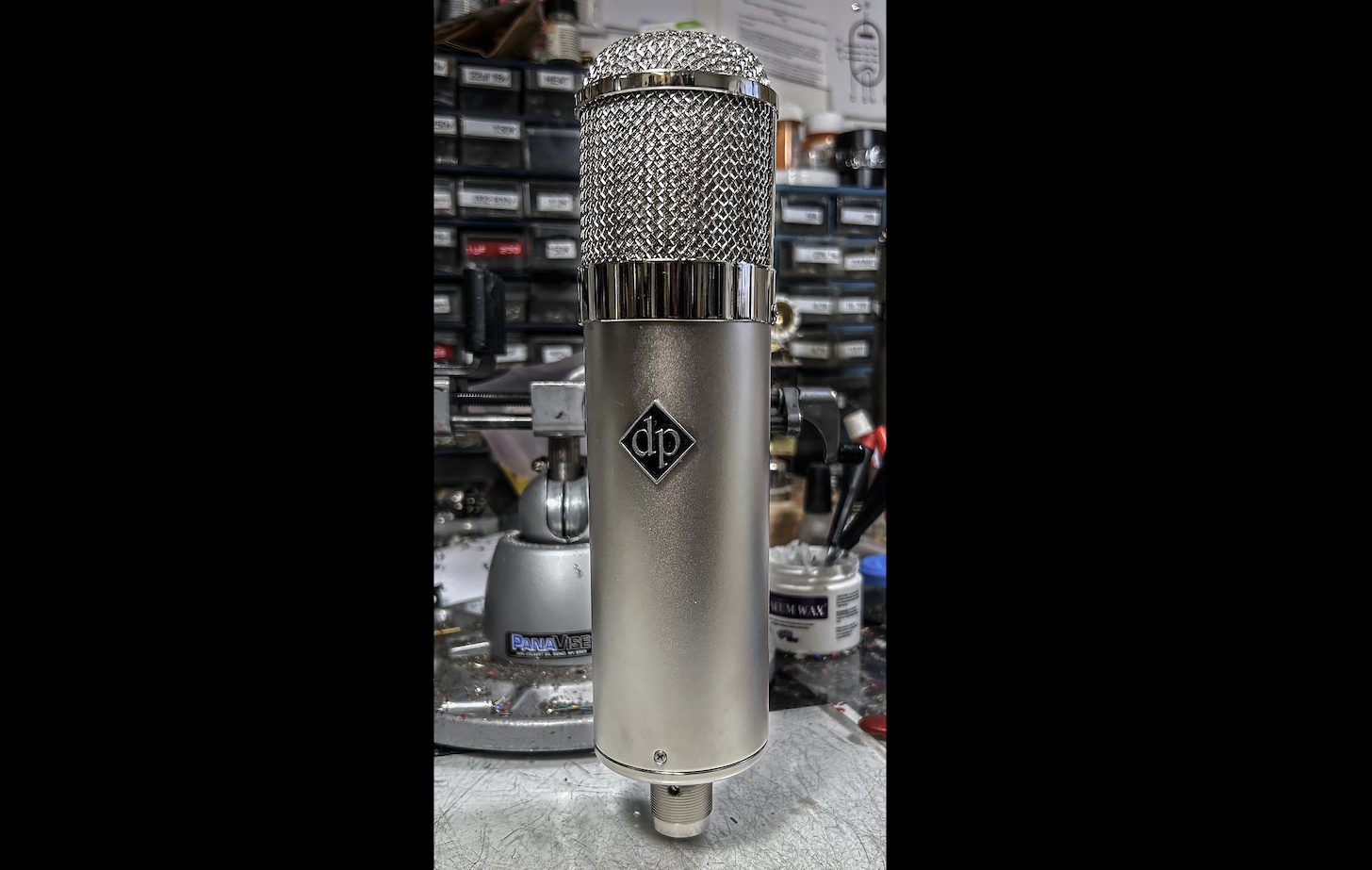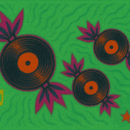Following 2024’s GRAMMY win for (self-produced and self-released) debut solo project So She Howls, Carla Patullo returns with Nomadica, a stunning collection of sound reuniting the Scorchio Quartet (Lorenza Ponce, Frederika Krier, Martha Mooke, Leah Coloff + Philip Glass, Laurie Anderson) and Tonality (led by Alexander Lloyd Blake), and featuring Martha Wainwright. While So She Howls rode an undertone of gentle, unresolved angst, Patullo’s latest offering feels more open and vulnerable. Having lost her mom suddenly in a car accident 20 years ago, she had never fully processed the grief. This record opened the door.
“She had been at my apartment and had just left,” shares Patullo. “It was just this sudden grief and shock. I think you just process it a little bit different. You still have to accept this unexpected shift in your life, but for many years I think I had this anger inside me about it. I think this ties into So She Howls. Going through my [own] experience and becoming close with death myself, I was able to have this gratitude for life. There's been this shift in me to be able to accept things more. After that journey with So She Howls and cancer, I was able to look at this from a different lens and really appreciate the moments I had with her [and] the strength that she left me that helped me get through my own personal struggles.”
Just before her win for Best New Age, Ambient, or Chant Album, Patullo recalls seeing her mum smiling. “I am spiritual, but not in a religious way,” she says. “It was the weirdest thing. You're in that intense moment of the GRAMMYs [and] 10 seconds before they announce, I could see my mom smiling. It was the image I thought of going through this whole [new album] process. Maybe that's when things really started to open up for me?” Patullo just reached her five-year cancer-free anniversary, and the commemoration of 20 years since losing her mom, which landed differently this year. “I hadn't been able to go to the cemetery and do all the things, especially in the beginning,” Patullo confesses. “People would host these vigils or masses and I would be there, but I wasn't really there. I just felt this need to celebrate her, that I could celebrate her now. I'm just grateful for the time I did have, even though it wasn't as long as I had hoped for.”
Patullo’s new album was also inspired by Andrew Haigh’s movie All of Us Strangers, a story that navigates unspoken words following unexpected loss. Patullo says the film got her “brewing with music,” that she could relate to the unheld conversations, and says the album started there. “I hadn't come out to my mom. All these life things that happened….she never met my partner,” she admits. “Conversations have been brewing inside me. I've been wanting to connect with my mom. The music just started coming and kind of flowed out again.” Revisiting the sudden loss, she imagined an encounter with her mother and navigated through dreamlike memories of conversations she wishes she had been able to have, recognizing a newfound absence, and reaching a place of acceptance, connecting with support from the other side. From the opening ethereal invitation of “Our Love Is,” gently soothing title track “Nomadica,” and tear-inducing comfort of “Arrival,” to the gentle journey of “Undercurrent,” and inspirational, uplifting energy of “Isochronic Waves,” Patullo’s new project does not disappoint. The celebratory release of “Lightning” and exhalation of “Below the Surface” lead into the relieving acceptance and sendoff in “Fly Under” (Patullo’s collaboration with Wainright). Grief, healing, redemption, and joy are all painted through her orchestral passages, lush acoustics, dreamy vocals, and adventurous electronic sound, delivering a spellbinding and genre-fluid oasis of human emotion. Meandering a path to closure and healing, having met herself more deeply with the new album, and giving herself permission to feel, it is clear that another level of Patullo’s artistry has been opened.
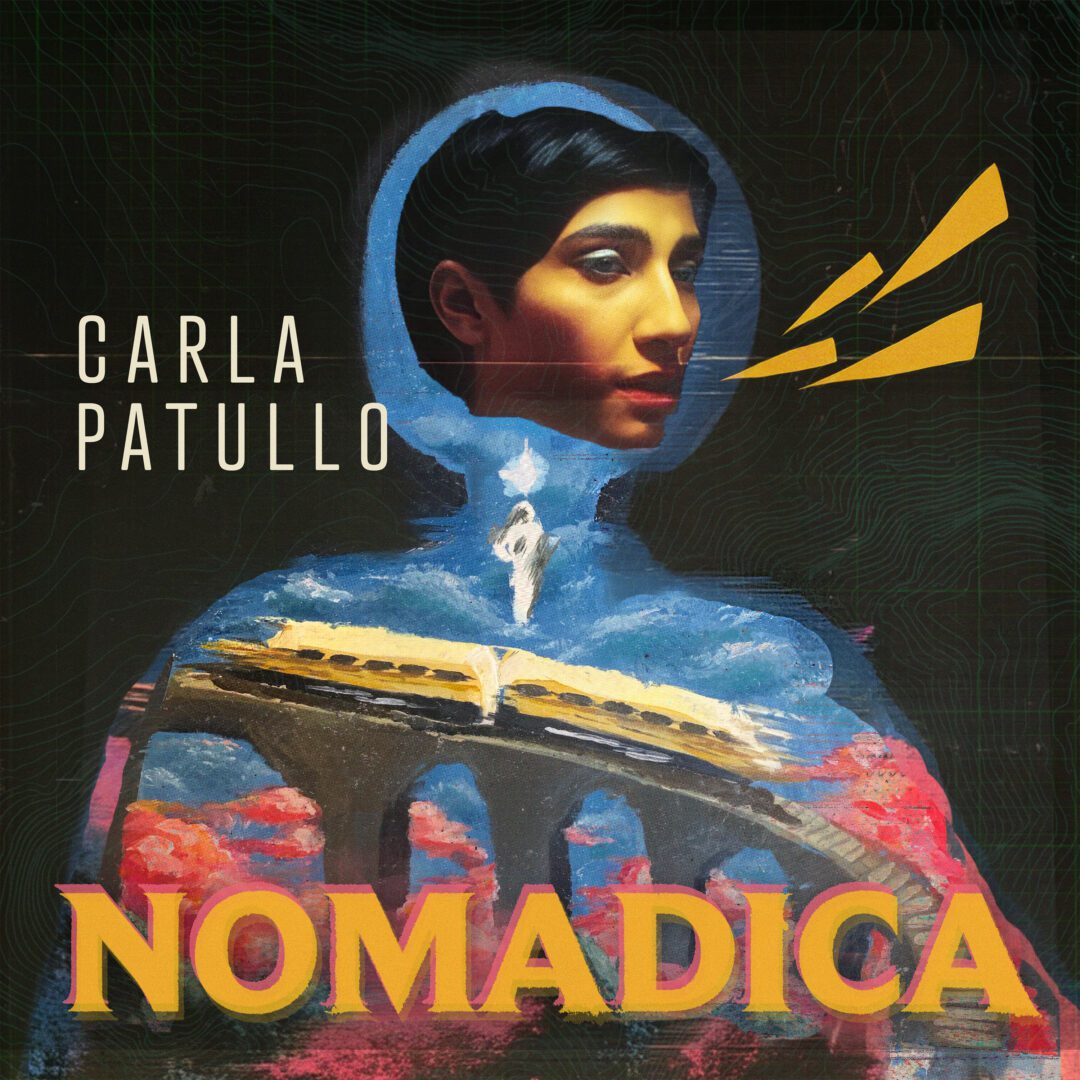
A source of constant inspiration for much of Patullo’s approach to her work stems from 1920s art and animation pioneer Lotte Reininger (animated documentary feature, Shadowmaker is in the works). Drawn to Reiniger for her strength and perseverance in following her own passion at a time and in an industry where she was never truly acknowledged, Patullo says Reiniger, “just kept doing it and found the people who believed in her to be part of her team. I can totally relate with that.“ Wanting to share her love of her creative work, Reiniger kept working well into her later years and was passionate about leaving her technique behind. Adds Patullo, “she loved shadow puppets and film so much. She has a whole book with instructions on how to turn your coffee table into a multi-plane camera. She really wanted people to do this at home because it brought her so much joy. I think that's just so beautiful of her. It's not just about being the first animator, she loved her puppets and continued to do live action shows with them.” Despite being overshadowed by Disney (1936’s Snow White followed Reininger’s preceding 1926 film, The Adventures of Prince Achmed), she did a workshop on their lot where Disney teams were all inspired by her presentation and began doing stop-motion animation again.
Patullo definitely shares Reiniger’s level of passion, and part of the magic of Patullo’s work lies in the authenticity of her recordings (like the raw vocals of So She Howls that captured the real-time emotion of her cancer journey), and the most powerful takes on many of her projects end up being the less polished ones (Patullo’s vulnerable, intimate vocals are also sprinkled throughout Nomadica). This can sometimes be a tricky on projects for others, but Patullo emphasizes that it is worth having the conversation for the powerful track that often ensues. ”Definitely try to let them in on what you're doing and tell them, ‘listen, you know, this first take, I know it's not as polished, but have a listen to it again and this is what I like about it.’ Sometimes filmmakers are editing and perfecting things where you just want the perfectly tuned vocal, or perfectly edited cut, and you don't want that rawness to come through,” shares Patullo. “But sometimes you just need to be reminded, ‘oh, actually this is raw and beautiful. This is special. You cannot recreate this.’ I double my vocals a lot and I've learned that lesson where there's a line where the way I sang it is so cool—so cool that it can’t be doubled.” The same is true for the edits and knowing when a piece is finished. “It’s just this overwhelming feeling where you're like, ‘I've said it all. This is it,’" says Patullo. “When you're in editing mode and you want to fix everything, you [often] realize it’s getting worse, so you go back to where it was. That's the tricky part.”
Bridging the gap between projects for others and her own creative work all comes down to the storytelling. The films Patullo chooses to work on always resonate on some level. “When I look at a film project, I want it to be something that I can connect with, something I have experience with,” says Patullo. “A lot of times in the films I work on, there's something personal to me that I'm able to bring to the project. The collaborators who worked on my project [Nomadica] were able to bring their moms into it and that makes it much more poignant when it's performed together.” She continues in saying that not every collaboration is the best, but that she has learned to make space for the unexpected. “I think that's really important. I do it with my personal work too,” she adds. “You have the song crafted and then take away that layer. [Don’t] be afraid to change—film scoring will teach you that—and believe that you can create something better than what you [had].” She openly acknowledges that she is often inspired by her creative team and others.
Incorporating space is paramount within Patullo’s pieces. “It's a thought. It's breath. It's a roadmap in a way, where you need to pause to know where you're going next,” she says. Working with Martha Wainwright on Nomadica, Patullo says Wainwright (who, along with brother Rufus, lost their mother—folk musician Kate McGarrigle—to cancer in 2010) has her own way of phrasing things. “We were figuring out how this song evolves and where it goes,” Patullo shares. “There was a line in our track 'Fly Under' that had a breath in it and she connected the whole line together. All of a sudden, it had this different weight to it. That is so cool—just to be able to flip the weight around, give it more impact, or change it in this way. It's subtle. Those spaces are so delicate.” Leaving space to breathe magnifies the weight of what's being delivered. Adds Patullo, “allowing the space for beautiful things to come in and giving yourself that space to listen, I stand by that. Being able to listen and not always [having] output.”
Being more established now, Patullo is also careful to only work with those who see value in her work as a creative. “I want to know what the director sees in my music and my sound to begin with, and what drew them to me. We both need to know how we connect, you know? If they’re looking for a John Williams’ score, I'm not the composer for that, I don't write in that style per se,” says Patullo. “I [want to] be artistically honest and do the music I love. There are a lot of film composers out there who do all the genres, do everything, will do a sound-alike. I'm at a point where I really just want to do what I do, and if someone sees that as something that connects with their film, then I'm the right person.” Projects have to have coherence and Patullo guards her artistic integrity.
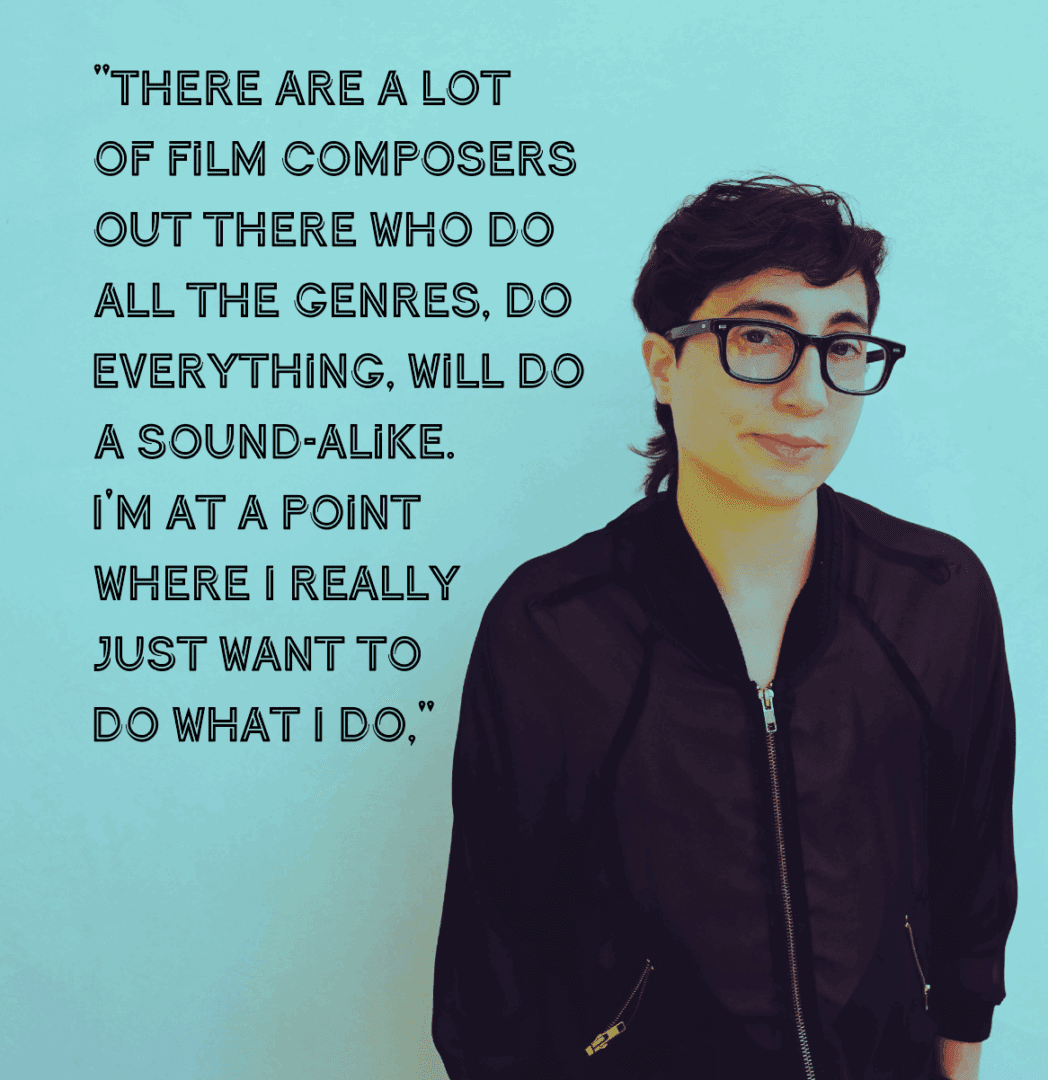
Nature is also big component of Patullo’s work. An (as-yet unannounced) upcoming project involves building a soundtrack from the script and traveling to the set for field recordings to incorporate into her soundscape. First using this method in her early film scores and projects, Patullo’s process became more prominent with 2019’s Stonewall OutLoud documentary, using archival and ambient sound to intensify the emotional and historical impact of the piece. So She Howls used extensive field recordings of nature and live machinery, taking her process up a notch with forest, breath, and ritualistic sounds that included members of the TheaWave collective. “Music's this portal where you can escape to this world, create, have intimate emotions and conversations with yourself, and really be able to explore things,” says Patullo. “It's almost like meditation in a way. You're in this still place where you can create and explore your feelings.”
Creative success is also about knowing when not to work. “I learned going through So She Howls and with cancer that when you sit in a room and you just start butting your head and you're like ‘I'm gonna write this, stay up all night and just finish this’—that's when I get into trouble.” When she gets stuck, Patullo says it’s about returning to her life: going for a walk, taking a nap, and taking care of herself to get back into creative flow. “Sometimes we can be our own worst critic. Being able to just be—and it's hard—I have to remind myself what to do.” You’re allowed to be human.
“Everything is so fast. You pick up your phone, you're on social media, and you’ve got feeds… everything is just a lot,” expresses Patullo. “What I love about ambient music is the listener can really reflect on and absorb it.” With colleagues advising her to stop making records, and to instead release singles and short content, Patullo says, “I feel like the album is something so special. Having an album so that you can create and have a story—that's at the core of what I do.” While she doesn’t listen to her own music after it is released, she admits that 2024’s So She Howls will remain a pivotal milestone, and a bookmark for a time of deep personal challenge—and triumph. ”It’s always going to be there for me as this remembrance of what I went through, even though it was hard. There's this joy and connection in it. The ability to connect with people through music was really beautiful,” she adds. “I had a lot of people reach out to me, people going through cancer, [or who have] someone affected by it, and people who are struggling. To know their stories, to know that there is this connection, I think is so important. That's what helps people get through their stuff. When I was going through it and I was in a room with other cancer patients, that connection helped me, knowing that there were people with me and I wasn't isolated and alone. [It was the] same when I was coming out of the closet. I have a community to fall back on and So She Howls is a reminder.”
Patullo’s work—and entire being—is all about connection and community, recognizing the safety and support in being around like-minded people. Championing women, immigrants, and members of the LGBTQ+ community, she is proud to be a Board Member of the Alliance of Women Film Composers and credits her mentor Laura Karpman as being a huge support to her. Patullo worked on Built for Zero’s documentary about homelessness that chronicled communities coming together to help people one-on-one to get off the streets, start over, and rebuild. Even in her GRAMMY acceptance speech for So She Howls, she was quick to credit the pioneering team of women in the early 1990s Herceptin drug trials with saving her life (she watched the Harry Connick, Jr. film Living Proof and learned about it while navigating her own treatment). Her life and work continue to be about shared experiences and feelings, and showing how we are all connected, and Patullo hopes the new record will help listeners connect in a way that helps them process their unresolved grief. “With All of Us Strangers, when I watched that film (and I watched it quite a bit), it really unlocked this emotionally shut door that I couldn't get to. I hope maybe [Nomadica] can do this [for someone],” she shares.
With multiple score and soundtrack credits, including Tribeca and Sundance films, and over 100 song placements in television and film (Disney+, HBO, PBS, Spa Night, Sabrina The Teenage Witch, Teen Titans Go, The Ellen DeGeneres Show, Skins (UK)), Patullo’s work is well-respected and she has become recognized for an ability to extract deep feeling from the listener (and/or viewer). The release of a project with Martha Mook from the Scorchio Quartet and film Bitter Root (for which she wrote) are in the works. New record, Nomadica is out now.
Contact Jeff Sanderson - Chasen PR, jeff@chasenpr.com; Visit Carla Patullo at carlapatullo.com

